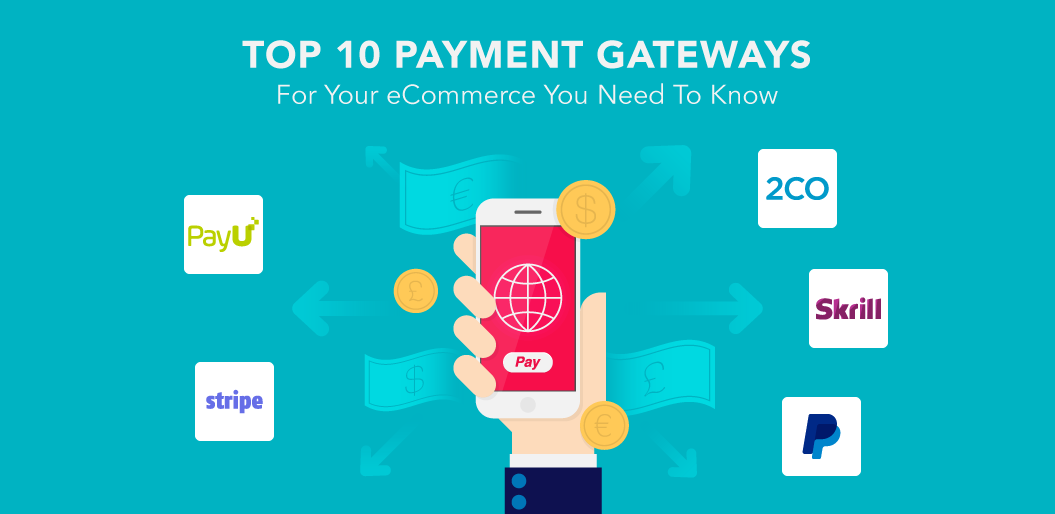Answers

Apr 13, 2019 - 09:37 AM

Image credit: Netsolutions.com (builder of digital solutions that customers love!)
What Are Payment Gateways?
First, let’s define what a payment gateway really is, since they often get confused with payment processors and merchant accounts.
A payment gateway is simply the technology that allows your ecommerce store to process debit and credit cards. Online payment gateways serve the same purpose as point-of-sale terminals in brick-and-mortar stores. You need payment gateways because you actually aren’t allowed to send payment information directly from your website to the payment processor: it’s too much of a security risk.
Payment processors, on the other hand, do exactly what they say: process the payments you receive. Basically, the payment processor reviews and sends data about the transaction, while the payment gateway authorizes funds to be transferred from a customer to your store. Payment processors link your payment gateway with your merchant account, and provide an important layer of security for your customers.
Your merchant account is just the bank account that ultimately accepts the payments from your ecommerce store. It’s not the same as your business bank account, though. It just collects deposits from your store, keeping things organized before the funds get transferred to your business account.
If you’re using a payment gateway, you’ll need a merchant account, but they aren’t the same thing. However, your merchant account may come from the same company you use for your payment gateway or payment processing.
How to Choose Ecommerce Payment Gateways
With those definitions in mind, here are some of the factors that might influence your decision as to payment gateway providers.
User Experience
Making a purchase needs to be easy for your customers; otherwise, they’ll give up before completing the transaction. That’s why customer experience should be at the top of your mind when choosing gateways.
Customers tend to click away from time-consuming purchase processes, such as those that require them to enter all of their personal information anew, or ones that don’t load well on a mobile phone. Look for a gateway that’s easy to use, mobile optimized, and that saves information securely.
Payment Methods
Although payment gateways primarily work with credit and debit purchases, you don’t want to drive away shoppers who want to use a different method. Some gateways let you accept other payment types, like bank transfers. Get to know how your customers usually like to pay, so you can choose a gateway that meets their needs.
Multiple Currencies
In addition to considering payment methods, you should also consider how many currencies your gateway will let you accept. This is especially important if you plan to market to a global audience.
Price
Although you’re right about the similar base rates, some gateways have other hidden fees that can jack up the price. Check to see if there are fees for cancellation or other surprises that might raise the cost of using a certain gateway.
Analytics
Any ecommerce store owner knows data is everything when it comes to making business decisions. That’s why you might want to choose a gateway that gives you easy access to the analytics. Without this information, you can’t target and resolve issues in your payment process.
Subscription Options
If you sell something on a recurring or subscription basis, will your payment gateway let you accept recurring payments? Automating the process of sending reminders, creating billing plans, and more through your gateway makes life much easier.
Security
Last but definitely not least, you should look for a payment gateway that’s as secure as can be. Your customers are entering their financial information in your gateway, and you need to make them feel confident about doing so.
Security breaches can devastate your business through chargeback fees, lost customers, and a damaged reputation. Don’t do damage control: find a payment gateway that will avoid breaches in the first place. Look for gateways that offer powerful methods for fraud detection and prevention.
Oh, one more thing! If you are in a risky industry (porn, gambling, nutraceuticals etc) most main stream providers will not want your business. But here are a few options to consider.
Sep 14, 2019 - 05:50 AM
I believe PayPal is the most common payment gateway.
Sarah, https://www.PegasusOne.com




Add New Comment